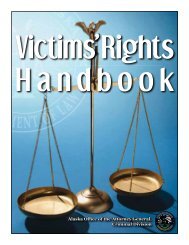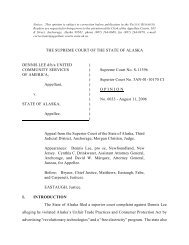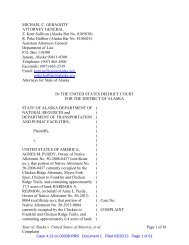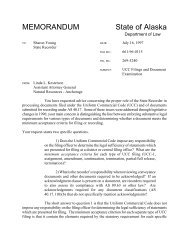Initial Report and Recommendations - Alaska Department of Law
Initial Report and Recommendations - Alaska Department of Law
Initial Report and Recommendations - Alaska Department of Law
- No tags were found...
Create successful ePaper yourself
Turn your PDF publications into a flip-book with our unique Google optimized e-Paper software.
“The State <strong>of</strong> <strong>Alaska</strong> is m<strong>and</strong>ated by the state constitution to provide basic publicsafety services within the areas in our region where no local governing body providesthese services. The State provides funding for a VPSO in only nine <strong>of</strong> our villages. Thismeans that, in the best-case scenario, six <strong>of</strong> our 15 villages must make-do withoutVPSOs. As it is, the funding that we receive does not afford enough to pay for salariesthat would attract anyone for this difficult job. With a starting salary <strong>of</strong> $14 an hour, aVPSO may qualify for food stamps <strong>and</strong> public assistance under certain circumstances,<strong>and</strong> studies show that an alarming number <strong>of</strong> VPSOs are forced to seek this assistance.Statewide, the turnover rate <strong>of</strong> VPSOs is estimated at 40 percent annually. In our region,only 1/3 <strong>of</strong> our villages currently have a VPSO. In the villages that do have a VPSO, theperson is on call 24 hours a day, 7 days a week, 365 days a year with minimal overtimebudgeted for them. They do not carry weapons <strong>and</strong> must rely on the Troopers in Nome ifa situation escalates. Yet one study found that 75 percent <strong>of</strong> unarmed village <strong>of</strong>ficers hadresponded to a perpetrator with a firearm.”Melanie Edwards, Vice President, Kawerak, Inc.Another change recommended by the Commission that would benefit lawenforcement is banning written order sales <strong>of</strong> alcoholic beverages to dry or dampcommunities, thereby preventing residents <strong>of</strong> dry communities from taking delivery <strong>of</strong>alcohol in areas where it is legal to receive alcohol. 83 Furthermore, the Commissionacknowledges that there is a need to make it easier for law enforcement to detect illegalshipments <strong>of</strong> alcohol to rural <strong>Alaska</strong> <strong>and</strong> that shipping alcohol in plastic containers makesdetection more difficult (compared to shipping in glass containers). It thereforerecommends that shipping <strong>of</strong> alcohol in plastic containers should result in a sentencingenhancement or aggravator, unless the containers are sent to a distribution site. 84Given the relative lack <strong>of</strong> law enforcement in rural <strong>Alaska</strong> to enforce state <strong>and</strong>tribal orders related to child protection, child abuse, domestic violence, <strong>and</strong> sexualassault, the Commission recommends that (a) the State adequately fund <strong>and</strong> staff theVPSO program to help provide this important function, (b) federal funding be obtained85, 86for tribal law enforcement, <strong>and</strong> (c) cross deputization <strong>of</strong> law enforcement occur.Because the lack <strong>of</strong> adequate medical response in many rural <strong>Alaska</strong> villagesmakes sexual assault crimes harder to prove, <strong>and</strong> the lack <strong>of</strong> law enforcement withspecialized training also aggravates the problem, the Commission recommends that the<strong>Department</strong> <strong>of</strong> Public Safety, in conjunction with regional Native non-pr<strong>of</strong>it corporations(a) develop part-time law enforcement positions for smaller rural <strong>Alaska</strong> communities83848586Recommendation 17.Recommendation 18.See <strong>Alaska</strong> Federation <strong>of</strong> Natives Resolution 04-14 adopted at the 2004 Annual Convention, aresolution in “Support <strong>of</strong> Rural <strong>Law</strong> Enforcement in <strong>Alaska</strong>'s Villages” supporting the VPSO program,<strong>and</strong> calling on the State legislature, governor <strong>and</strong> congressional delegation to design a program that willadequately address public safety needs in villages. See also Final <strong>Report</strong> to Governor, <strong>Alaska</strong>Commission on Rural Governance <strong>and</strong> Empowerment, 1999 (a local law enforcement <strong>of</strong>ficer should bepresent in every community in <strong>Alaska</strong>, with particular attention to <strong>of</strong>f-road communities; all categories<strong>of</strong> <strong>of</strong>ficer should be fully trained, equipped, staffed, paid, <strong>and</strong> acknowledged as part <strong>of</strong> the overarchingpublic safety system; effective public safety requires coordination with local communities, tribes, <strong>and</strong>regional non-pr<strong>of</strong>its. The <strong>Department</strong> <strong>of</strong> Public Safety should train local <strong>of</strong>ficers to extend the reach <strong>of</strong>the public safety system; training for local <strong>of</strong>ficers is necessary to help them balance cultural sensitivitywith pr<strong>of</strong>essional ethics.Recommendation 19.<strong>Alaska</strong> Rural Justice <strong>and</strong> <strong>Law</strong> Enforcement Commission - Page 49
















